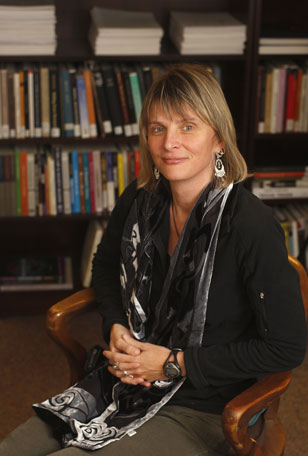Postdoctoral fellow studies empathy in relation to crime and punishment
Michelle Brown grew up in south-central Indiana and earned her undergraduate and graduate degrees from Indiana University, but it wasn't the appeal of coming back home that enticed her to become part of the Poynter Center's "Virtuous Empathy" research project.
Rather it was the fact that the project meshed so well with her scholarly work, which explores the cultural meaning of punishment and pain as experienced in prisons and other institutions of social control and exclusion.
"When I saw the announcement for the position with the Poynter project, it just seemed like a wonderful opportunity that was at the heart of what I'm trying to do," she said.
Brown, an associate professor in the Department of Sociology and Anthropology at Ohio University, is the postdoctoral research fellow with the project "Virtuous Empathy: Scientific and Humanistic Perspectives," which is co-sponsored by the Poynter Center and IU's Institute for Advanced Study.
Working with IU scholars in fields as diverse as history, philosophy, religion and neuroscience, she is pursuing research that focuses on empathy and the law, including the interplay of empathy, moral discernment and rationality in punishment and criminal law.
"This project really brings together units and disciplines that almost never work together," she said. "And we're taking the conventional concept of empathy and standing it on its head - we're starting from a very complex place."
Brown earned her bachelor's degree from IU Bloomington in comparative literature with a focus on film studies, then added a master's in criminal justice and a joint Ph.D. in criminal justice and American studies. As a student, she wrote a senior thesis on Hollywood rape scenes and worked with Middle Way House, a Bloomington agency that helps women who experience domestic violence.
Her book The Culture of Punishment: Prison, Society, and Spectacle (NYU Press, 2009) explores the relationship between media portrayals of imprisonment and the distancing of penal institutions from the larger society. Her upcoming book, with co-author Nicole Rafter, is Criminology Goes to the Movies.
The virtuous empathy project, she said, provides a framework for thinking differently about law and criminology. "Another thing I enjoy is there's something going on all the time," she said, referring to the busy schedule of seminars, guest speakers and meetings with the IU scholars involved in the project.
Brown expects to contribute to a 2011 symposium that wraps up the project and to produce writings for an anthology of scholarly work related to the initiative. "But I'm definitely working on another book project," she said. "I think this will be very much at the center of it."
